Weibo social media crisis learning from Sesderma in China
With almost 400 million monthly active users by the end of 2017 on Weibo, without a doubt, every foreigner brand would consider Weibo as an important social media channel to build up awareness in China. We can imagine if one brand could appear on the top search topics, it may be because they have successfully created a big issue, but on the other hand, the popularity maybe also comes from unexpected negative feedbacks which a small issue could turn into a serious PR disaster in the blink.
We can always learn from other’s case and prepare tailored social media crisis management for our own brand in advance, and this time we learn from Sesderma’s experience.
Sesderma hit No.27 on the Weibo top search topics
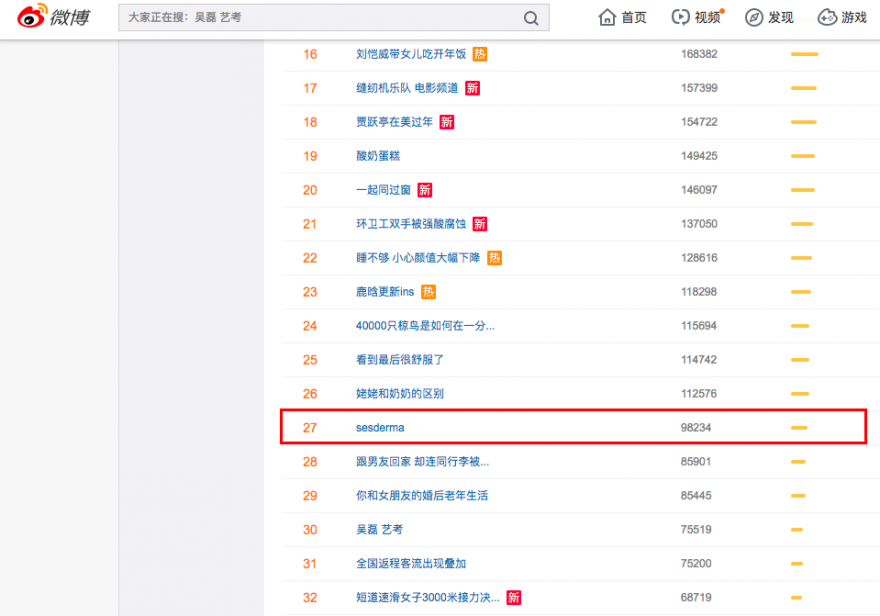
On the daily social media monitoring, we found that Sesderma, the well-known Spanish dermocosmetics brand was on the hot search list on Weibo, but they were dealing with the crisis out of a careless mistake in China. Their account has more than 7,000 fans, but the brand name search volume was 14 times more, we can assume the negative news brought in lots of people who aren’t familiar with the brand Sesderma before. What caused the PR crisis exactly? Let’s get back to where the issue started.

2/17 12 pm: Sesderma’s controversial post
Their intention was to educate the fans how to apply their product for a better result and created the post in a soft and self-deprecating way, but the critical part is they said “you” are poor and “you” don’t have money, so they misled the perspective and turned out to discriminate against the fans. Unfortunately, since then, the post started to accumulate passive comments in a quick-speed.
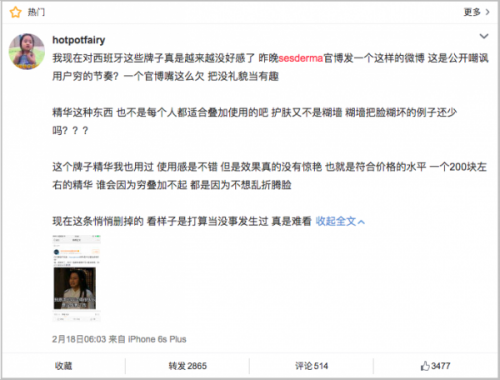
2/18 6 am: One user posted the negative feedback about Sesderma’s post (share:2,865 / comments:514 / likes:3,477)Not only the improper content, but the way Sesderma managed the issue. The user found Sesderma directly deleted the original post and without responding to fans’ anger. The post just went viral afterward, and it easily pushed Sesderma on the hot search list on Weibo.
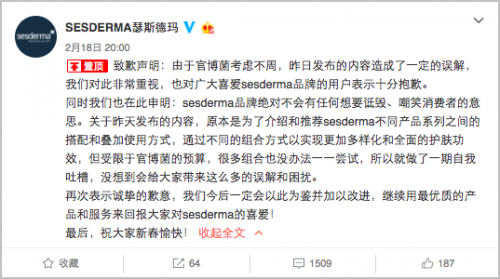
2/18 8 pm: Sesderma apologized sincerely to their fans
After waiting for more than one day, Sesderma had an official post to apology for their careless mistake. According to the comments, most of the fans could accept and left their support notes, but Sesderma continued to occupy the hot search topic position, until late afternoon on 2/20. Social media crisis comes easily, but it’s definitely hard to disappear.
3 takeaway to prepare crisis management on social media in China
1/Respond timely and as long as the mistake is confirmed, a sincere apology and open communication is needed
In many cases, actually, the crises are avoidable, if we can manage the potential crisis timely, and organize the crisis management team if necessary with members from involved departments, to create a open dialogue with fans within 24 horas.
2/Self-deprecating humor is easily taking over on social media, but extra care and attention for this kind of content is crucial
Sometimes self-deprecating humor is delicate, it’s better the content can be viewed and checked by different people to taste the respond. And keep the first person perspective clearly through whole content, as we can see in the Sesderma’s case, as long as you change the perspective, self-deprecating post could backfire quickly.
3/Chinese local team represents the foreign brand in China, so it’s important to work closely with headquarter to deliver the brand value
Even though many foreign brands have local subsidiary or agency to execute all the Chinese market marketing communications in China, but work integrally and have regular meeting is essential to keep both parts on the same track towards the ultimate success.
If you are interested in developing business in China through online marketing and e-commerce, 2 Open are glad to listen to you, please feel free to contact us by e-mail: INFO@2OPEN.BIZ, or just leave us a message below, we will get back to you as soon as possible.
2 Open & Zonamerica, to develop China Latam Ecommerce
Zonamerica opens a branch in China and collaborates with 2 Open offering ecommerce services for Latin American companies in China
Chinese traveling user generated content platforms: Mafengwo vs Qyer
” 世界那么大,我想去看看 ” ( There is such a big world that I would like to see it all ) is a sentence once written as the reason for resignation and later suddenly became a buzzword on Chinese social network.
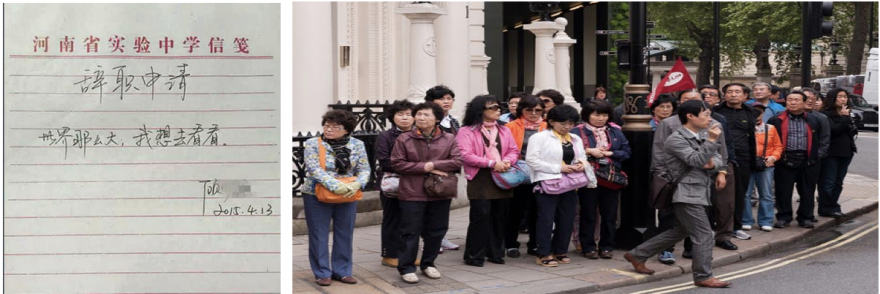
These years, more and more Chinese prefer independent travels to package tours. Especially, the grown up 90s generation, who are highly individualized and strong-minded, has become the main E-consumers of those traveling user generated platform such as Mafongwo and Qyer.

For example, Miss Xian, a traveling platform user from the 90s generation living in Guangzhou, China, gave up package tours for more alternatives a couple years ago. She had already stepped in South East Asia, America and Europe. Her preference is well organized in-depth trip with her family. Since her husband is too busy to do the planning, Miss Xian is responsible for handling it all. “Every time I am planning for a trip, I need some suitable travel platforms which offer practical and comprehensive reference for my destination. These years, I have been using mostly Qyer and Mafongwo interchangeably.” she said.
WHAT ARE MAFENGWO AND QYER EXACTLY?
Mafengwo : A Dream Realizer Started With A Community

In 2006, Chen Gang and LV Gang who worked in Sina and Sohu respectively set up this online travel community for their interest in traveling around and sharing travel pictures. 10 years ago, when independent travel was still a niche, mafengwo.cn accumulated users and contents through word-of- mouth. In 2010, they officially started commercializing mafengwo.cn. Apart from traditional OTA mode, they wanted to earn profits from existing contents directly.
By 2017, mafengwo.cn has gained over 100 million members, 80% of them are from mobile apps “ Mafengwo Independent Travel “. By Oct. 2016, according to the second quarter financial results of OTAs (Online Travel Agency) , Ctrip, Qunar, Tuniu, the top OTAs in China, were all in varying degrees of financial loss, while mafengwo.cn announced a turn from loss to profit eventually.
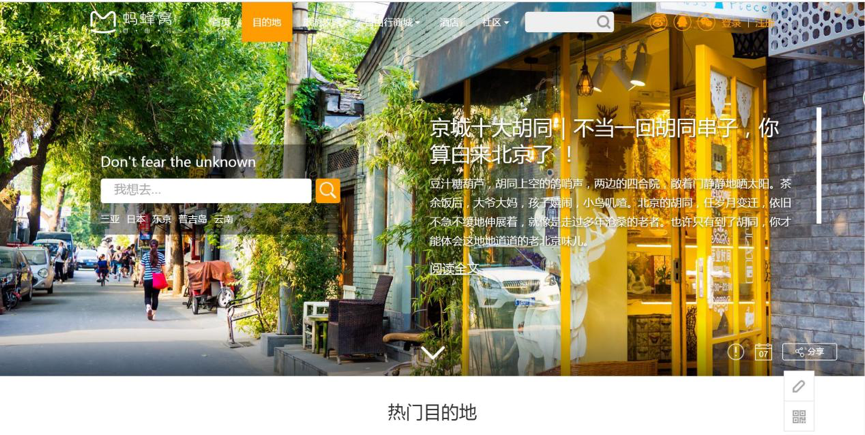 Nowadays, mafengwo.cn has become an UGC (user-generated content) platform where Chinese can share photos, travel notes, journals and Q&A online. It targets Chinese domestic users and independent travelers who need tourist reference, destination ranking lists and other recommended to-do things for their trip planning. Right now, 3,000 journals, 5,000 Q&A, 10,000 comments, 100,000 footprints are generated daily.
Nowadays, mafengwo.cn has become an UGC (user-generated content) platform where Chinese can share photos, travel notes, journals and Q&A online. It targets Chinese domestic users and independent travelers who need tourist reference, destination ranking lists and other recommended to-do things for their trip planning. Right now, 3,000 journals, 5,000 Q&A, 10,000 comments, 100,000 footprints are generated daily.

Moreover, it integrates resources contributed by users to make travel advice books among global destinations. Those books have been downloaded over a hundred million times.
Qyer : A Digital Bible for Chinese Backpackers
There are many other similar small-sized UGC communities in China market but a well-known competitor within Tourism Community category is Qyer.
 At the very beginning, Qyer was set up by Xiaoyi in a dorm room. He was an international student studying in Hamburg, Germany in 2004. Once, after he got stolen at the airport while he was traveling in Europe, he became a real backpacker with very little money to survive. Then, he set up Qyer as a forum to better help oversea students share their experience, advices and wise tips of saving money during the trip. Then, Qyer started accumulating useful tips on the platform and became more and more popular in China. Within four years, Qyer had gained more domestic than oversea users. Therefore, Qyer moved back to China in 2008 and received strategic investment from Alibaba in 2013.
At the very beginning, Qyer was set up by Xiaoyi in a dorm room. He was an international student studying in Hamburg, Germany in 2004. Once, after he got stolen at the airport while he was traveling in Europe, he became a real backpacker with very little money to survive. Then, he set up Qyer as a forum to better help oversea students share their experience, advices and wise tips of saving money during the trip. Then, Qyer started accumulating useful tips on the platform and became more and more popular in China. Within four years, Qyer had gained more domestic than oversea users. Therefore, Qyer moved back to China in 2008 and received strategic investment from Alibaba in 2013.
 Right now, Qyer aims at making oversea traveling more convenient and cost-effective for Chinese. Meanwhile, it does offer information for domestic destinations but these contents usually do not show up on its homepage.
Right now, Qyer aims at making oversea traveling more convenient and cost-effective for Chinese. Meanwhile, it does offer information for domestic destinations but these contents usually do not show up on its homepage.
WHAT ARE THE DIFFERENCES BETWEEN MAFONGWO.CN AND QYER?
The intriguing fact is mafengwo.cn and Qyer seem to intentionally keep in balance in the market. Mafengwo.cn puts more effort on domestic traveling, while Qyer mainly focus on travelling abroad. There is even a viral saying among the users: “Choose Mafengwo in-bound, Qyer out-bound”
In conclusion:
Traveling users generated content platform is difficult to develop and gain profit. It requires long-term user loyalty and content accumulation without guarantee for commercialization. But the potential of the UGC-big data commercial mode has already headed above water. With the huge amount of contents generated by users such as different links between accommodation reservations, attractions and dining recommendations, these data value mining is essential for breaking the barrier upstream and downstream. The one that’s faster to complete model transformation will be the winner.
Comparison/Platforms |
Mafengwo |
Qyer |
Traffic & loyalty |
More traffic and relies more on search engine optimization (SEO marketing). |
Less traffic but more users’ loyalty since the demand frequency of overseas traveling is less than domestic traveling.Qyer’s strategy is based on a “members get members” type of expansion. |
Targets |
Both target youngsters between 18 and 35 who prefer independent travel. Qyer also targets backpackers. |
|
Focus |
Mafongwo.com focuses on users sharing by creating topics and activities to encourage users to post their journals |
Qyer emphasizes user-to-user communication by operating its forum and offering appealing interactive promotions both online and offline.For instance, Qyer has already launched Q-homes in Chiangmai (Thailand) and Tokyo (Japan), which are offline bases offering Chinese-speaking comprehensive services. |
Functions |
The main functions are similar. They both offer travel journals, tips books, Q&A, top destinations and commercial functions.But Qyer has developed several apps for users convenience, such as ” 行程助手 ” (Itinerary Assistant), which helps users to make a detailed itinerary by automatic generation and manual setting. It collaborates with Booking.com( a hit for overseas accommodation reservations) for users to simply add reservations in the itinerary or book directly from Booking.com. Transportation settings and automatic distance calculation are also included in the sites. Moreover, it provides 2 ways to output itinerary: (1) A document fits with Visa requirements (2) A huge PDF itinerary books including all the photos or tips, details of each chosen accommodation reservations, transportation, attractions and restaurants. |
|
Home Page quality |
Update more often |
Update less often and there are even some journals from last year. |
[recent_posts count=”3″ date=”true” thumbnail=”true”]
Alibaba high-end membership APASS, what the luxury brand needs to know
September 9th was Alibaba’s APASS Day
Red carpet, hot girls and boys dressing up, while this is not a movie award ceremony, it is the first APASS off-line anniversary event held by Alibaba recently in Shanghai. They also invited Martha Lahti, SKII, Estee Lauder and many other international brands to join.
At this event, Alibaba Chief Marketing Officer Dong Benhong first revealed the level of APASS spending: “Based on the current membership size, these APASS members spend at least 30 billion RMB of their net purchases each year.”

Who is this group of people?
According to Ali group customer experience drive and Innovation Center General Manager Wang Hai, he said “APASS members are mainly trendy mothers, business elites, online shoppers and business generation”.
Here we have some examples. Zhang Yixin is a freshman in college. She spent 1 million last year on beauty products, jewelry and other luxury goods to simply just dress herself up.
Wang Ruoxi has 12 years of experience on Taobao. She would spend 800 thousand to buy luxurious watches and many other pricy goods including exorbitant Martha Lahti. Last year, she bought 16 brand-name handbags on Taobao. Right now, she makes her own skin care brand on Taobao’s line and transitions into a seller from a buyer.
In addition to our “super-chop type” buyers, Zhu Rongfei, one of the APASS members, is a “collection type” buyer. She bought more than 300 sets of Lego Limited Edition toys online as she is a maniac Lego fan.
What is APASS?
This lavish style of spending has made them gain the Alibaba Passport, also called APASS. It is an exclusive rewards program and a combination of Facebook, Amazon Prime and the American Express Black Card. Its 100,000 members get unusual perks in daily life such as abnormally good deals on trips, free return of products purchased online and considerate personal service. Meanwhile, they are also encouraged to join online communities of shopaholics who blog and talk up Alibaba.
 When Zhang Yixin mentioned the APASS membership service, she spoke with excitement: “What moved me most was that once, just right before an important show I had the next day, I lost my dresses that I was going to put on. The exclusive customer manager managed to find a seller in the city at night and got me the dress in time. It was amazing.”
When Zhang Yixin mentioned the APASS membership service, she spoke with excitement: “What moved me most was that once, just right before an important show I had the next day, I lost my dresses that I was going to put on. The exclusive customer manager managed to find a seller in the city at night and got me the dress in time. It was amazing.”
What luxury brands should know about APASS?
If luxury marketers doing business in China want to understand Chinese consumers better, they need to pay for professional market research agencies to do it. The APASS program offers a shortcut for brands to achieve this goal. It not only allows them to gain insight into their potential consumers, but it also shows them who they should target directly.
Even though it remains ambiguous whether APASS truly has what it claims to offer to luxury brands in China, brands such as Louis Vuitton, Ocean glasses, Antonio Banderas Guerlain, and Maserati are already among those who are beginning to test out what the APASS can reach.
If you need help to sell in China, contact us!
[recent_posts count=”3″ date=”true” thumbnail=”true” category=”1″]
Alibaba Overcomes Baidu in Chinese Digital Advertising
According to a new report from eMarketer, experts predict that the decline of Baidu in favor to Alibaba is due to the new market conditions in Chinese digital business. Alibaba has adapted fast to the last digital ads regulation and currently enjoys the leadership in terms of online advertising revenue.
The Chinese Internet landscape is characterized by the huge prominence of the three technology giants.

As you may know, Baidu is the largest player in China in digital advertising market, Alibaba is the Chinese eCommerce leader firm and alongside both, plays Tencent.
These Top 3 in digital industry are estimated to command a total of 60% in ad revenue in the present year, and amount around $42 billion.
What factors have led Baidu to its future decline?
Although currently Baidu still controls the largest share of the online advertising market, the success of the company in 2015 is far from repetition. Baidu’s share in China’s digital ad market is expected to drop to 21% in 2016, and forecasts are less positive for the coming year.
In early September, in the team we analyzed in our article “New Online Advertising Rules in China” the new online advertising regulation in China and its impact in all digital business with presence in China.
The Internet Ad Interim Measures is a new regulation prompted by the State Administration for Industry and Commerce of China. It arose from the Government’s claim by adopt new rules over online advertisement, at the time it was expected to impact on Chinese Digital Marketing as a whole.
As we mentioned before, some fields were subject to special regulation: healthcare, medicine, food and beverage. But new regulations also affect to Internet advertising practices with some other measures: it is required that all paid ads to be clearly marks in search results, prescription medication and tobacco ads have been forbidden and it is already mandatory to certain medical and health products.
From the beginning, these changes were identified by outside analysts as a serious handicap for the future of the company. As Shelleen Shum told,
“We think the impact will be larger on Baidu than on the other search engines given Baidu’s larger market share and its dominance in medical service ads.”

But the coming into force of the new rules, is not the only reason for its current decline. The lack of strong mobile devices is also affecting its ability to attract advertisers.
The main driver in the Chinese market is the mobile platform. As Lyu Ronghui said,
“Huge traffic is the bedrock of online advertising business. But unlike Alibaba and Tencent, which have numerous successful mobile products that can attract traffic from users. Baidu still lacks a new cutting-edge to help jumpstart its slowing traditional search business.”
Facing Baidu, Alibaba has surpassed its rivals taken advantage of the new conditions. As Shelleen Shum explains, its reinforcement is due to,
“Although also affected by the new regulations, Alibaba’s ad revenue, particularly from the mobile sector, shows no sign of abating thanks to the robust growth of its e-commerce retail business.”
Although at present Baidu controls 28% of the online ads marketing, Alibaba is expected to become the largest player in China’s digital advertising market before finishing 2016.
New rules in China
In China, digital landscape changes as faster than imaginable. There are plenty of creative ways to sell your services and products in China, but acting in the hand of a company based in the country, is always a big extra bonus for your business in China.
In search of a Digital Marketing & Ecommerce Agency?
Sources:
5 Bugs To Avoid When Doing E-Commerce In China
Have you ever tried to build a new overseas brand and fail in your attempt? In any approach to China, foreign brands often make some common mistakes when trying to sell their products in China mainland. Although such misconceptions are not exclusive to online environment, we will focus on those that particularly affect your approach to e-commerce in China. China is already the world’s first e-commerce market.
Are you going to miss its enormous potential?
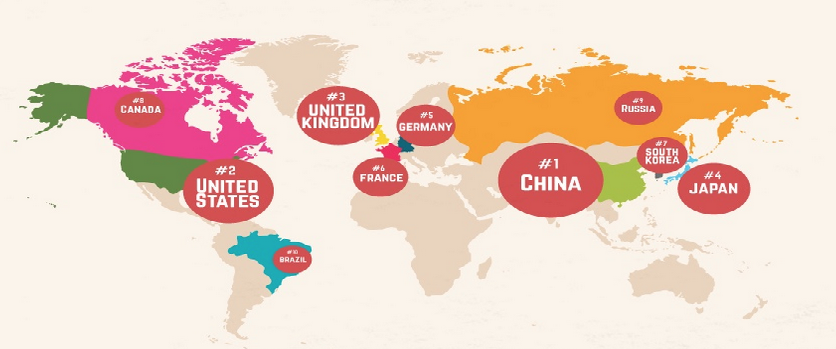
First bug: China is mobile, and you better record it
It is not the first time we tell you this, and for sure it won´t be the last. As we mention before in our article “How to Take Advantage of the Latest Ecommerce Revolution?”, Ecommerce has been a great revolution for both companies and customers.
Nowadays, Chinese prefer to use their mobile devices rather than their laptops and according to the new trend, companies have already starting to adapt themselves to portable devices. Moreover, those companies using U-commerce are focused on improving the customer experience through customizing and navigation created in cooperation with the User.

Second bug: E-commerce may be an asset in your country, but in China is irreplaceable
We cannot fail to mention Frank Lavin, CEO of Export Now, when he says,
“In China, Ecommerce is the cake.”
This may mean that you will need to adapt your business to the new environment. Do not expect it to be China who suits you, this does not work this way.
Remember that whoever hits first, hits twice. Embrace e-commerce as the enabler of your business it is, and take advantage of the immense benefits that electronic commerce can bring to your company to start selling around the World!
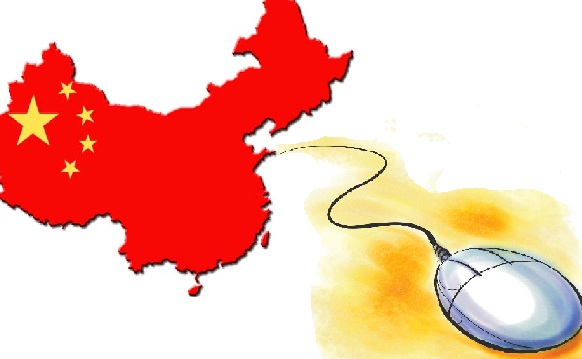
Third bug: Social Media is there to stay. Register your account and start moving!
Surely you’ve never heard the words Baidu, WeChat and Weibo… and let us tell you that you have a huge problem in China.
Not only around the 93% of the online searches in China are done in their own search engines –Have you ever heard Google does not work in China?– but also about a 68% of the customers take a look on the official Social Media account before buying.
Do not miss the opportunity to have a voice in that huge chicken coop is the network, start developing a tailored communication strategy for your brand and gain your piece of the cake!

Fourth bug: Domestic and lazy thinkers, or how the triumph from a day doesn’t make it daily
Do you think you will keep doing in China pretty much the same things you were doing before and as a result you will achieve success?
A basic rule you should never forget again is, no matter the experience and the many different markets in which you have entered before, is that new horizons always implies a new starting on your understanding of the target, so we definitely encourage you to start a market analysis.
Will your brand be competitive in China?
Do you offer something different regarding your competitors?
Is there a suitable market niche in the country ?
These and a thousand more questions require a prior discussion, keeping in mind that China should not be underestimated: the country enjoys some peculiarities you definitely must know before starting your landing.
We strongly recommend you seek assistance from professionals focused on the Chinese market, in order to enhance your chances of success in the country.

Fifth buf: Do not try to do everything by yourself, ask for advice
We are not tired of saying it, and will do so again: China is not a flat road. Do not try to embark on this mission unaccompanied, but pick very well with whom.
Look for complementary partners interested in joining forces, go to Government agencies dedicated to external actions and internationalization and definitely search for specialized agencies in the country to start outsourcing some tasks.

Already in search of a consulting expert in digital marketing and e-commerce? You have come to the right place.

10 Challenges On Chinese Future
Any approach to Chinese landscape ends falling into the same debate: Will China evolve or break over the next years?
Although experts do not agree (And neither do we!), in the team we believe it is important to name some of the most immediate challenges ahead for China.
Current challenges are also the challenges of the future
When we talk about China, no one agrees. The huge boost experienced by China in the last thirty years has not buried the doomsayers who year after year have sown doubts about the future of China. Faced with them there are some enthusiasts who proclaim that the next world leadership belongs to China. Who has the reason? Not everything is white, not everything is black. Both sides are right.

Reforms, Where to start? Ten points to keep in mind
China is characterized by the dynamism that has developed in recent years. In order to ensure the future growth of the country, Chinese authorities must address some issues of particular importance:
First, Local Government Debt:
Local and regional government debt have been a terrible headache for analysts. We would like to underline the explanation Nicholas Zhu, senior analyst at Moody’s, gave,
“For the local government direct debt, we believe the government is finding a handle by capping it at 16 trillion yuan ($2.45 trillion) overall and improving the structure by swapping some existing debt into bonds at lower cost and longer maturity.”
However, in recent times the central bank started to allow qualified individual investors to buy and sell the bonds through commercial banks.
Second, Reform State Companies:
The Government is attempting to reform the state-owned sector while continuing to maintain its currently control. To do this, some different attempts have been made, such as: mixed formulas, restructuring, mergers, open up protected service sectors to private and foreigners, them all focused on enhancing their competitiveness and autonomy on private-sector markets.
Third, Liberalize the Financial Sector:
Financial liberalization is a key in Chinese reform, and it is closely linked to the privatization phenomenon itself. Both reforms will be needed to maintain Chinese growth, and facilitate the creation of jobs and the reliably channels credit to companies. The success of economic reforms carried out, will be a determining point of stabilization or social destabilization, and are a sensitive issue in governmental action. As the country opens its doors further, as the former Australian ambassador to China, Geoff Raby said,
“Equally China will be more open to capital inflows.”
Fourth, Investment:
Investment in China is drived by Foreign Direct Investment, as a key which gives advantages to the supplier and also to the host. Moreover, is a thermometer of the future of the business, and China has already started to capitalize its benefits. At the same time, FDI depends on some key – factors:
- Capital Availability: China is already the world’s largest recipient of foreign capital.
- Competitiveness: Rests on the country’s capacity to develop its infrastructure, resource availability, productivity and workforce skills.
- Regulatory environment: A difficult legal doctrine and excessive regulation, have been a serious handicap for investment in China. Things are changing, but it is still far to be as it should be.
- Openness to trade –especially international one.
Fifth, Deflation:
To achieve the Chinese structural goals, it is a necessary condition that the country’s growth rate is maintained over 5 years above 6.5%. Moreover, in China Dollar strength prevents avoid closing 2016 with deflation, and has contributed to high capital outflows in recent years.
Sixth, Chinese Demand for Hard Commodities:
A very important point to consider for countries that produce raw materials as iron, copper or aluminum. Its prices will drop sharply as long as its demand will go slower. This expectation is opposed to food, which will keep increasing due to the growth of Chinese middle class.
Seventh, Manufacturing:
China´s export competitiveness are based on three main principles: low unit – labour costs and interested rated, and an undervalued yuan. Due to the paradigm shift, it is expected that China’s strength at this point has begun to crack; an opportunity for others countries after all!
Eighth, Innovation:
Over the past five years, China has promoted with great vehemence its innovative sector. The technical, economic and human development are impressive, especially its efforts in Science & Technological graduates. According to Mckingsey Global Institute,
“China must generate two to three percentage points of annual GDP growth through innovation, broadly defined. If it does, innovation could contribute much of the $3 trillion to $5 trillion a year to GDP by 2025.”
Nineth, Environment:
China lives in a permanent Environmental crises: air and water pollution, deforestation and desertification, biodiversity, high rates of cancer and the growth of a middle-class who is adopting a Western –style consumer patterns have become a huge problem for future. China needs to change the course of its current model. Therefore, he has embraced renewable energy.
Tenth, Consumption:
We cannot talk about Environment without mention Consumption. The sharp increase of in domestic consumer patterns and the Chinese middle-class prosperity, will need of a sustainable and growing consumer economy based on the need of big service sector reforms.

Companies must be ready. How to be competitive in China?
The rapid evolution of the world stage precludes long-term estimates. Having an updated database and the example of a specialized agency, is always a clear advantage in any approach to the market, but even more in China. It has never been enough for global business to know what is coming, but also knowing how to take advantage of every opportunity that arises in the market.
In search of a specialist Agency in the Chinese environment? Are you interested on Digital Marketing and Ecommerce?
New Online Advertising Rules in China
New online advertising regulation in China will impact all digital business with presence in China. Here we bring you an analysis overview to start adapting to the new trend in advertisement.
It would be after the death of a college student who took part in an experimental health treatment found in Baidu, when popular pressure would force the Government to begin an ads regulatory change.
The Internet Ad Interim Measures, a new regulation prompted by the State Administration for Industry and Commerce of China, went into effect in September 1st. Therefore, it arises from the Government’s claim by adopt new rules over online advertisement: email, paid searches, embedded links, images, and videos are already subject to the new law. Its aim is avoiding the spread of misleading advertisements on the Net, and correct the prevailing liberality so far.
The new online advertising regulations are expected to impact on Chinese Digital Marketing as a whole: social media, search engines, apps and electronic commerce in the country will have to move under the new guidelines.
A step closer to the uses and customs in Western advertisements
For the first time in China, the new measure features a specific definition of Internet advertising; often, foreigners suffer from a lack of legislative safety in China. Therefore, conceptualization is a step forward to define clearly not only the concept, but also its extension:
“Internet advertising is advertisements that directly or indirectly sell commercial goods or services through the websites, web pages, internet applications and other forms of Internet media including text, images, audio, video and etc.”
Moreover, the regulation comes to underline its main purpose:
“To protect the legitimate rights and interests of consumers, and promote the healthy development of the Internet advertising industry.”

In what fields are these changes applicable? What changes will take place after its implementation?
The regulation is particularly focused on a list of fields described below:
-Healthcare and medicine
-Food and beverage
The main measures to be starting to apply can be summarized as:
–First, the Law requires to place the word “advertisement” in a prominent position and clearly distinguishable at first sight.
–Second, every field subject of special regulation needs a previous review and an approval process by authorities.
–Third, online advertisements for prescription medicine is banned. A special measure in health products is also extended to medicines, pesticides or medical supplies.
–Fourth, tobacco online ads are also banned.
–Fifth, any paid search results, links or content must be clearly identified by the word “advertisement”.
–Sixth, users should not only have the choice to close an ad, but also this has to be easy to them.
–Seventh, paid links and contents must be clearly detailed at a glance.
–Eighth, any attached ad and/or promotional links to an email should have been allowed previously.
–Ninth, any misleading and/or false ad is considered illegal from now on.
Who is especially affected by the new regulation?
Under this measure, the biggest impact falls on the largest Internet companies in China. Baidu and Bing should apply new restrictions on ads; it should not be forgotten that, much of the incomes of Baidu, Weibo or Alibaba come advertising.

But also traditional Social Media must change. WeChat or Weibo offer paid content; as we mention before, pop-ups, ads or links should be first permitted, which will force companies to evolve the way advertising is offered to Chinese users. Seems marketers should start creating better ads, or contravening the prevailing legislation with all the penalties that that means.
There are plenty of creative ways to sell your services and products in China. In search of a Digital Marketing Agency?
Infographic: 10 Things You Need To Know To Build a Chinese Website
A picture is worth a thousand words
After the great success achieved by our two articles 10 Things You Need To Know To Build a Chinese Website (I) (II), in the team we have thought it would be a good idea to summarize and turn them into an infographic.
We hope you enjoy it as much as we enjoyed its elaboration 🙂
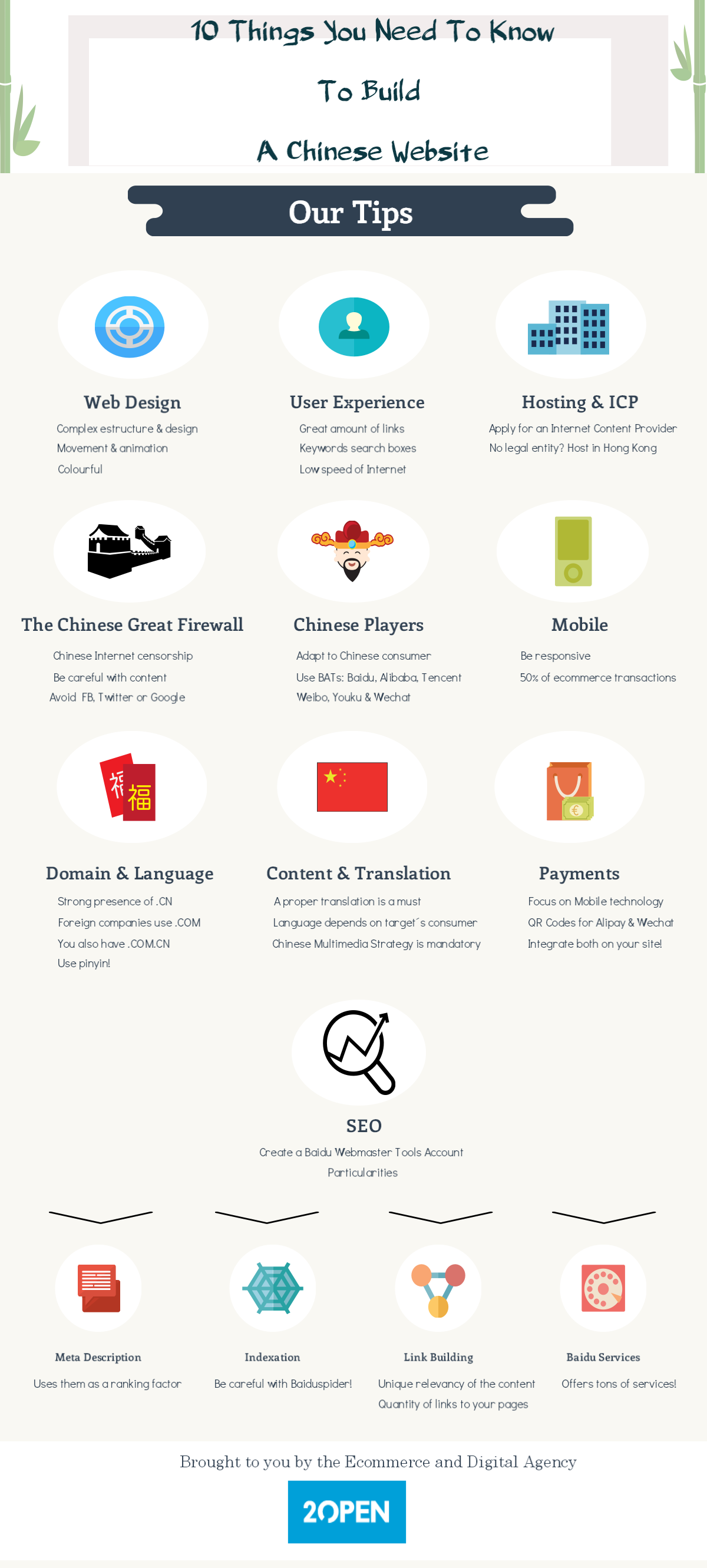
Are you looking for a digital marketing and ecommerce agency?
Visit us. Let´s have a talk!










